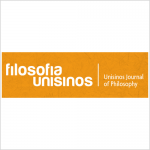The cogito of Descartes as an extreme resumption of “know thyself”
Vol 10, No 1 (2009) • Filosofia Unisinos - Unisinos Journal of Philosophy
Autor: Miguel Spinelli
Resumo:
The goal of the article is to analyze the cogito (the epistemic presupposition of Descartes’ science) from a very specific point of view: as an extreme resumption of know thyself, the maxim that originated and stirred philosophizing in its beginning. The article takes as a reference La Recherche de la Verité, a dialogue Descartes wrote in 1641, right after the Meditations. The truth alluded to refers, on the one hand, to the precepts of science, that is, to what about things and phenomena we can objectively affirm as constituting knowledge; on the other hand, to the knowing subject, in relation to which the cogito, beyond overcoming doubt (pertaining to knowledge in general), has the role of rescuing the I in its own singularity: as the objective, human I, naturally given to self-knowledge as a knowing subject.
ISSN: ISSN: 1984-8234
Texto Completo: http://revistas.unisinos.br/index.php/filosofia/article/view/5003
Palavras-Chave: Descartes,cogito, truth,knowledge,science

Filosofia Unisinos - Unisinos Journal of Philosophy
The journal Filosofia Unisinos - Unisinos Journal of Philosophy is published once every four months by Universidade do Vale do Rio dos Sinos.
Articles must be original, unpublished, and not under consideration for publication anywhere else and can be written in Portuguese, English or Spanish
Filosofia Unisinos - Unisinos Journal of Philosophy prints articles, translations and critical book reviews. It also reprints papers that are considered fundamental to the area when authorized written permission is given by the original publisher.
